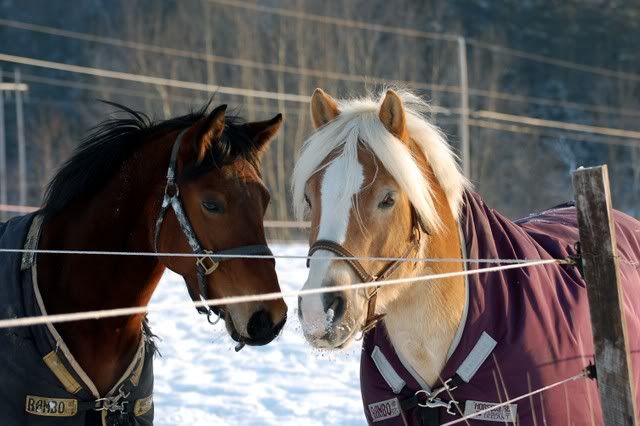The Canadian Horse or Cheval Canadien is one of Canada's best kept secrets. It is a true, recognized horse breed, inherent only to Canada.
The breed descended from the best horses from King Louis IVX stables. They were sent to Canada by the King to reward his best men who had gone to settle the "new world", between 1665 - 1670.
These founding horses were of Spanish Barb, Andalusian, Norman and Breton origin. They bred together with no outside influence for several hundred years, eventually evolving into a distinct breed in its own right; the "Canadian Horse", a breed which has now been shown to be genetically distinct from all other popular racing and riding breeds in existence today.
For the next 100 years after their ancestors arrived in Canada, the breed developed under adverse conditions of near starvation and harsh climate, thus becoming extremely easy keeping, hardy and strong. These characteristics won the Canadian Horse the nickname the "Little Iron Horse".
Their strength was legendary. It has been said that the Canadian was capable of generating "more power per hundred pounds of body weight than horses of any other breed".
The Canadian Horse registry was one of the first recognized North American horse breed registries in North America. It predated the Morgan Horse registry which opened in the United States in 1894. The breed registry has been administered by the Canadian Livestock Records Corporation, since 1904.
Although relatively unknown today, the Canadian Horse was at one time quite common. In the mid 1800's the Canadian Horse population numbered nearly 150,000, and was spread throughout North America.
The Canadian Horse assisted in the settling of nearly every Canadian Province. Historical literature and paintings, such as those done by Cornelius Krieghoff, document the early pioneers moving from the east to the west, on the backs of, or in wagons pulled by their Canadians Horses.
Their calm natures made them ideal for many purposes. They were exported in large numbers to the United States for use both in the American Civil War, and on the stagelines.
The breed is renowned for its prepotency or ability to pass on its desirable characteristics. For this reason, it was used for founding or improving many horse breeds. Other North American developed breeds such as the Morgan, Tennessee Walker, Missouri Foxtrotter, American Saddlebred, and Standardbred have all been proven to have proven foundation Canadian Horse stock in their backgrounds. Because of their ability to improve other breeds, large numbers of purebred Canadians were lost from their own genetic pool because they were used so extensively for outcrossing to other breeds.
By the late 1800's, the numbers began to decline rapidly with the ongoing mass exports. By the mid 1900's, due to increasing farm mechanization, the breed basically disappeared in every Canadian province except for Quebec.
On the verge of extinction in the 1950's, the breed was resurrected by opening the stud books to previously unregistered, but known to be purebred horses.
Despite these efforts, the Canadian Horse once again nearly disappeared again during the 1970's when the numbers dropped to approximately 400 horses in existence, and fewer than 5 registrations per year. Thankfully, the plight of the breed was finally recognized, and with the help of dedicated breeders from all across Canada, the numbers have once again been increasing.
With a rapid growth in the breed numbers over the past ten years, the current population still only numbers approximately 6000 horses worldwide. Even now, there are just a scant 300 or so new registrations per year. Compare this to the worldwide population of the American Quarterhorse at nearly 3,000,000, and the yearly registrations (in the US alone) of the following breeds: Quarterhorse 150,000, Thoroughbred 37,300, Paint 64,500, and the Morgan at 3,800.
The Canadian Horse is genetically unique. In 1998, a genetic study published in the Canadian Horse Annual stated: "This shows us that the Canadian, bred in isolation for so long, does still appear to be genetically distinct from the popular racing and riding breeds, reinforcing the need to give high priority to its conservation".
As of April 29, 2002, the Canadian Horse has officially been recognized in Parliament, as the "National Horse of Canada". This title gives this unique, tough, and good natured breed the rightful recognition and place in Canadian history that it so richly deserves!

